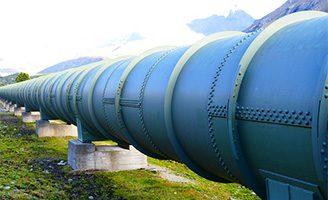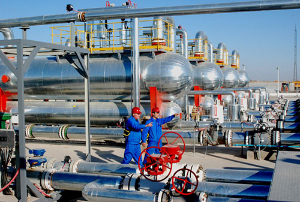Turkmenistan Poised for TAPI Breakthrough
By Micha’el Tanchum (03/18/2015 issue of the CACI Analyst)
With the drastic reduction and imminent cessation of Russian imports of natural gas from Turkmenistan, China has become Turkmenistan’s sole export market. While welcoming economic cooperation with China, Ashgabat has been working assiduously to avoid undue economic dependence on Beijing. The Turkmen government’s new determination to diversify the markets for its natural gas seems to have provided Ashgabat with the motivation to make key concessions for the construction of the Turkmenistan-Afghanistan-Pakistan-India (TAPI) pipeline. By creating the first significant overland link with India, the TAPI pipeline project will not only diversify Turkmenistan’s gas exports but will permanently alter the pattern of Central Asian connectivity.

CACI Analyst, March 3, 2015
CACI Analyst, March 4, 2015 (.pdf)
Contents
Analytical Articles
KAZAKHSTAN AND THE EEU, by Dmitry Shlapentokh
U.S. NEW SILK ROAD INITIATIVE NEEDS URGENT RENEWAL, by Richard Weitz
IS “TURKISH STREAM” A SERIOUS THREAT TO THE TRANS-CASPIAN PIPELINE?, by Juraj Beskid, Tomáš Baranec
CASA-1,000 – HIGH VOLTAGE IN CENTRAL ASIA, by Franz J. Marty
Field Reports
KYRGYZSTAN’S RESIGNED PROSECUTOR-GENERAL GIVES WORRYING PRESS CONFERENCE, by Arslan Sabyrbekov
MOSCOW PLEDGES TO COUNTERACT GEORGIA’S INTEGRATION WITH NATO, by Eka Janashia
ARMENIA TOUGHENS ITS STANCE AGAINST TURKEY, by Erik Davtyan
FOREIGN MINISTERS OF TURKEY, AZERBAIJAN AND TURKMENISTAN DISCUSS ENERGY AND TRANSPORTATION IN ASHGABAT, by Tavus Rejepova
Foreign Ministers of Turkey, Azerbaijan and Turkmenistan Discuss Energy and Transportation in Ashgabat
By Tavus Rejepova (03/04/2015 issue of the CACI Analyst)
Azerbaijan's, Turkey's, and Turkmenistan's Ministers of Foreign Affairs Elmar Mammadyarov, Mevlut Cavusoglu and Rashid Meredov gathered in Ashgabat on January 29 to discuss regional energy and transportation issues.
Cavusoglu, leading a big delegation, arrived in Ashgabat on January 28 to meet with President Berdimuhammedov and discuss the next day's trilateral meeting as well as Berdimuhammedov's expected visit to Turkey on March 3. Cavusoglu also met separately with his counterpart Meredov to discuss energy security, transportation and expansion of the current state of commercial ties. Turkey is Turkmenistan's main trade partner and Turkey represents the highest presence of foreign companies in Turkmenistan, at over 600 companies.
Mammadyarov met with President Berdimuhammedov on January 29 before the trilateral ministerial meeting and discussed enhancing commercial ties between the two countries. Referring to his last visit to Ashgabat five years ago, Mammadyarov expressed satisfaction with the current level of relations between Azerbaijan and Turkmenistan.
During the trilateral meeting between the ministers of foreign affairs, the sides discussed cooperation in the areas of trade, energy, transportation and education. In particular, the ministers stressed the Afghanistan-Turkmenistan-Azerbaijan-Georgia-Turkey transportation link project aimed at increasing trade and reducing cargo transit expenses among these countries, as an important objective. Representatives of these five countries met in Ashgabat in November 2014 over the draft agreement of this transport corridor.
Following the talks, the sides also decided to create a trilateral format for the oil and gas company representatives of the three countries. The ministers of Turkey and Azerbaijan reportedly invited Turkmenistan to join the Trans-Anatolian gas pipeline (TANAP) project, which envisages delivering gas from Azerbaijan's Shah Deniz field to Europe via Georgia and Turkey.
President Berdimuhammedov has stated earlier stated that the trans-Caspian pipeline, intended to bring Turkmen gas to Europe via TANAP, only requires the consent of two countries (Turkmenistan and Azerbaijan) whose seabed sectors these pipelines would cross. But Russia's Minister of Foreign Affairs Sergey Lavrov has stated that "the project of the trans-Caspian gas pipeline falls into the category of projects that affect the interests of countries that do not participate in it" expressing concern over the project. Maros Sefcovic, the European Commission's Vice President in charge of Energy Union, stressed the importance of addressing the technological and legal issues of transporting Turkmen gas to Azerbaijan in his address to reporters on February 12. Speaking at Turkmenistan's Oil & Gas Conference in Ashgabat in November 2014, Rovnaq Abdullayev, the CEO of Azerbaijan's energy company SOCAR, expressed readiness to provide Azerbaijan's developed infrastructure, diversified oil and gas pipeline network, warehouses and terminals, fleet of ships and other assets needed for implementing projects in the oil and gas industry to its neighbors in the region, primarily to Turkmenistan.
During the trilateral meeting in Ashgabat, Mammadyarov also met with Cavusoglu to discuss regional cooperation, highlighting President Ilham Aliyev's visit to Turkey on January 14-15, 2015.
The first trilateral meeting between the foreign ministers of Turkey, Azerbaijan and Turkmenistan took place in Baku on May 26, 2014, when the "Baku Statement" was released, expressing the three countries' determination to develop trilateral relations in various fields, particularly in energy, trade, transportation, culture, tourism, education and environmental protection through joint projects and cooperation initiatives.
As a result of the Ashgabat meeting, the foreign ministers signed a joint declaration and adopted a trilateral framework cooperation program for 2015-17. The foreign ministers also agreed to organize a trilateral meeting between the presidents of Azerbaijan, Turkey and Turkmenistan in Ashgabat, planned for October of 2015, which is expected to expand the trilateral partnership in energy, transportation and communication sectors to new levels. The next trilateral meeting between foreign ministers is slated to be held in Turkey.
Kyrgyzstan Expects Electricity Import from Turkmenistan to Address Its Power Deficit
By Tavus Rejepova (12/10/2014 issue of the CACI Analyst)
President Almazbek Atambayev, leading a large government delegation from Kyrgyzstan discussed the possibility of importing electricity and petroleum products from Turkmenistan during the official talks with his counterpart President Gurbanguly Berdimuhamedov in Ashgabat on November 11, 2014. Within the framework of the visit, a package of numerous bilateral agreements was signed to increase the level of commercial and economic ties between Kyrgyzstan and Turkmenistan.
The agreements include an agreement on establishing a Turkmen-Kyrgyz Intergovernmental Commission for trade, economic, scientific, technical, and humanitarian cooperation; an agreement between Turkmenistan’s State Committee for Sports and the State Agency for Physical Culture and Sports under the Government of the Kyrgyz Republic on cooperation in the sphere of physical culture and sports; a cooperation agreement between the ministries of culture of Kyrgyzstan and Turkmenistan; a cooperation agreement between the Chambers of Commerce of Kyrgyzstan and Turkmenistan; a Memorandum of cooperation between the Diplomatic Academy of the Ministry of Foreign Affairs of Kyrgyzstan and the Institute of International Relations of the Ministry of Foreign Affairs of Turkmenistan; an agreement between the governments of Kyrgyzstan and Turkmenistan on cooperation in providing reciprocal assistance over tax legislation compliance; an agreement between Kyrgyzstan’s State financial Intelligence Service and Turkmenistan’s Ministry of Finance on cooperation against money laundering and terrorism financing; and an agreement on cooperation in physical training and sports.
During the high level talks, President Berdimuhamedov said that Kyrgyzstan is Turkmenistan’s strategic partner in the yet-to-be constructed pipeline (Line D of the Turkmenistan-China gas pipeline) that will be constructed through the territories of Uzbekistan, Tajikistan and Kyrgyzstan to eventually reach China. Within the framework of the top level talks, Kyrgyz President Atambayev mentioned that Turkmenistan is currently ready to help Kyrgyzstan with electricity supply in the amount of 700 million kWh per year and increase this amount up to 1 billion kWh next year. Though this announcement came out during the press conference, no agreement, either on cooperation in the electricity sector or purchases and sales, was signed during the visit. The sides have not made it clear how and which route they would go to sell the promised electricity.
The only viable route to import electricity from Turkmenistan to Kyrgyzstan is through Uzbekistan but it was not clear how Kyrgyzstan was going to address the problem of transit via Uzbekistan. It is noteworthy that in 2009 Uzbekistan cut Turkmen electricity exports to Tajikistan across its territory when Uzbekistan withdrew from the united power grid of Central Asia’s electricity system. No electricity cooperation was mentioned during Uzbek President Islam Karimov’s visit to Turkmenistan on October 23-24. The Kyrgyz Deputy Prime Minister Valery Dil visited Ashgabat on October 25-26 to meet with President Berdimuhamedov and other government officials but no announcement was made to possibly addressing this standing issue.
Turkmenistan currently sells electricity to neighboring Afghanistan, Iran, and Turkey, and has held talks to sell to Pakistan in the future. In April 2013, the country introduced a US$ 5 billion plan to develop Turkmenistan’s power industry for the period 2013-2020 and announced plans to increase the current export amount of about 2.5bln kWh by five times within this period.
President Atambayev’s visit to Ashgabat followed his state visit to Kazakhstan on November 7 where he and his counterpart Nursultan Nazarbayev agreed on the import of one billion kWh of Kazakh electricity to Kyrgyzstan during the winter. This is in addition to an earlier report saying that Kazakhstan was going to supply 500 million kWh for water provided by Kyrgyzstan during the irrigation period. Kazakhstan is expected to produce an estimated amount of about 100 billion kWh of electricity in 2014. Kazakhstan and Turkmenistan’s possible electricity supply could significantly help Kyrgyzstan address its serious power deficit during the winter. The cost of electricity in Kyrgyzstan is expected to increase given that the reservoirs feeding hydropower dams are about twenty percent lower than usual. Kyrgyzstan’s power shortage is further exacerbated by uncertainty regarding the winter gas tariffs after Russia’s Gazprom bought 100 percent of Kyrgyzgaz for a symbolic US$ 1 with its estimated US$ 40 billion debt.
Atambayev has also expressed Kyrgyzstan’s interest in importing petroleum products from Turkmenistan such as gasoline. Relations between the two countries started improving this year, manifested in President Atambayev’s first-ever official visit to Turkmenistan. Turkmenistan appointed an ambassador to Kyrgyzstan in August this year, following Kyrgyzstan’s appointment of a new ambassador to Turkmenistan in July.
Between Prosperity and the Taliban: Will IS Tip the Balance in Turkmenistan?
By Micha’el Tanchum (10/29/2014 issue of the CACI Analyst)
While energy-rich Turkmenistan is poised to become the next economic tiger of Central Asia, it has come under a growing threat from the Taliban since NATO’s troop drawdown in neighboring Afghanistan. Forces from the Taliban and various multi-ethnic, Central Asian jihadist militias associated with the Islamic Movement of Uzbekistan (IMU) have been concentrating in northern Afghanistan near the Turkmenistan border, producing unprecedented border clashes with Turkmenistan’s military during 2014. IMU leader Usman Ghazi’s recent declaration of allegiance to the Islamic State raises the concern that the Islamic State might assist the opening of a new jihadist front.





